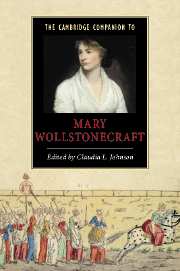Book contents
- Frontmatter
- 1 Introduction
- 2 Mary Wollstonecraft's letters
- 3 Mary Wollstonecraft on education
- 4 Mary Wollstonecraft's Vindications and their political tradition
- 5 Mary Wollstonecraft's French Revolution
- 6 Mary Wollstonecraft's literary reviews
- 7 The religious foundations of Mary Wollstonecraft's feminism
- 8 Mary Wollstonecraft and the literature of advice and instruction
- 9 Mary Wollstonecraft's A Vindication of the Rights of Woman and the women writers of her day
- 10 Mary Wollstonecraft and the poets
- 11 Mary Wollstonecraft's novels
- 12 Letters Written During a Short Residence in Sweden, Norway, and Denmark: traveling with Mary Wollstonecraft
- 13 Mary Wollstonecraft and the sexuality of genius
- 14 Mary Wollstonecraft's reception and legacies
- Select bibliography
- Index
1 - Introduction
Published online by Cambridge University Press: 28 May 2006
- Frontmatter
- 1 Introduction
- 2 Mary Wollstonecraft's letters
- 3 Mary Wollstonecraft on education
- 4 Mary Wollstonecraft's Vindications and their political tradition
- 5 Mary Wollstonecraft's French Revolution
- 6 Mary Wollstonecraft's literary reviews
- 7 The religious foundations of Mary Wollstonecraft's feminism
- 8 Mary Wollstonecraft and the literature of advice and instruction
- 9 Mary Wollstonecraft's A Vindication of the Rights of Woman and the women writers of her day
- 10 Mary Wollstonecraft and the poets
- 11 Mary Wollstonecraft's novels
- 12 Letters Written During a Short Residence in Sweden, Norway, and Denmark: traveling with Mary Wollstonecraft
- 13 Mary Wollstonecraft and the sexuality of genius
- 14 Mary Wollstonecraft's reception and legacies
- Select bibliography
- Index
Summary
Even though Mary Wollstonecraft had little to no presence in history or literature curricula as recently as a generation ago, she has never exactly been a minor figure. Some, certainly, have wished her so. A dauntless advocate of political reform, Wollstonecraft was one of the first to vindicate the “rights of man,” but in her own – brief – lifetime and ever since, she achieved notoriety principally for her championship of women's rights. And while some of this notoriety took the particular form of scandal of the sort that often attends women directly involved in public affairs, some of it she directly sought in her writing and in her conduct. Controversy always inspired Wollstonecraft, always sharpened her sense of purpose. Whether writing about education, history, fiction, or politics itself, she was always arguing – even her travelogue, written as a series of letters to her faithless lover, is an ongoing argument. And in turn,Wollstonecraft always inspired controversy. A revolutionary figure in a revolutionary time, she took up and lived out not only the liberal call for women's educational and moral equality, but also virtually all of the other related, violently contested questions of the 1790s – questions pertaining to the principles of political authority, tyranny, liberty, class, sex, marriage, childrearing, property, prejudice, reason, sentimentality, promises, suicide, to mention only a few. Clearly, she struck many a raw nerve. Although her A Vindication of the Rights of Woman (1792), for example, at first received fairly respectful reviews as a tract on female education, after England and France declared war, it was increasingly (and correctly) read against the backdrop of its broader progressive agendas on behalf of liberty. Thereafter, efforts to vilify Wollstonecraft, though sometimes marked by an air of puerile jocularity, were hysterically intense.
- Type
- Chapter
- Information
- The Cambridge Companion to Mary Wollstonecraft , pp. 1 - 6Publisher: Cambridge University PressPrint publication year: 2002
- 6
- Cited by

